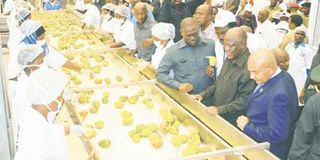Industry urges govt to expand export basket

President John Magufuli and Bakhresa Group Chairman Said Salim Bakhresa (right) during the inauguration of a Bakhresa Food Products Ltd (BFPL) fruit and vegetable processing plant in Mkuranga District, Coast Region last year. PHOTO | FILE
What you need to know:
Tanzania mainly exports metal products and food beverages, followed closely by textiles, petroleum and chemicas products, according to the East African Industrial Competitiveness Report 2017, which was launched last week.
Dar es Salaam. The Confederation of Tanzania Industries (CTI) has called for the diversification of the country’s export basket in the early stages of industrial development.
Tanzania mainly exports metal products and food beverages, followed closely by textiles, petroleum and chemicas products, according to the East African Industrial Competitiveness Report 2017, which was launched last week.
But CTI policy and advocacy acting director Akida Mnyenyelwa said the majority of manufactured goods do not meet international standards, partly because of low level of technology. “Majority of industries are less competitive when it comes to international trade,” he said.
This, he said, narrows the export basket. He explained that this also causes export earnings to fluctuate, which eventually leads to the problem of balance of payments, budgets deficits and does not permit future systematic economic planning
To avoid this, Mr Mnyeyelwa called for the diversification of the export basket at early stages of industrial development.
His sentiment was echoed by the head of industrial intelligence unit at the ministry of Industry, Trade and Investment Mr Valency Mutakyamirwa.
He said it is imperative for policy makers to deal with the issue of diversification of the country’s exports.
“This will help cushion the country against shocks arising from the instability in the foreign exchange markets, especially for primary products,” noted Mr Mutakyamirwa.
This strategy, he said, will contribute to the development of new export markets for manufactured goods destined for the EAC and other markets.
The findings of the report indicate that trade policy captured by openness and nominal exchange has a large effect on export competitiveness, their coefficients are large.
United Nations Industrial Development Organisation (Unido) representative to Tanzania, Mauritius and EAC Stephen Kargbo was also reading from the same script, saying diversification would reduce vulnerability to domestic and external shocks like natural disasters and sudden fluctuations in demand or global prices. He said products and market diversification would provide a room for stabilisation of the export earnings as it enhances movement towards activities with greater potential for value addition as well as greater potential for skills development and innovation.
“Market diversification is equally important as over-reliance on a single market has greater potential to adversely affect the economy in the event of reduction of in demand than diluted and stable demand in other markets,” said Mr Karbo.
Chairperson of the EAC Council of ministers Maganda Wandera on the grounds that diversification of the country’s productive and export structure is an important element of industrial competitiveness and economic development more broadly.




